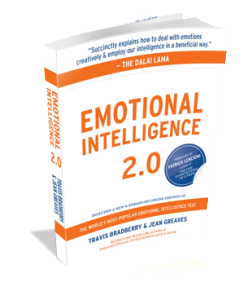 Today, I would like to share a little emotional intelligence insight with you. Emotional intelligence is a wonderful soft-skill for all Virtual Assistants to employ! I would love to say I am an emotional intelligence guru, which I am not (yet) but after implementing things in this area of my life, growth is evident.
Today, I would like to share a little emotional intelligence insight with you. Emotional intelligence is a wonderful soft-skill for all Virtual Assistants to employ! I would love to say I am an emotional intelligence guru, which I am not (yet) but after implementing things in this area of my life, growth is evident.
In August, I was able to attend The Global Leadership Summit and experience many amazing speakers. One of the leaders who presented was Dr. Travis Bradberry, co-author of Emotional Intelligence 2.0.
Before the summit, I had heard of the book and the concept of emotional intelligence (EQ), after all – I attended AssistU where we learn about many of the concepts and ideas around relationships, soft-skills, and reading non-verbal communication. But, I had not expected to run out to buy the book immediately after Dr. Bradberry finished speaking and to read it within the next week. I was blown away by how much I will gain from increasing my EQ.
EQ is not a part of your personality or intellect (IQ) which are somewhat unchangeable. However, EQ, coined as the “other smart”, is surprisingly the number one predictor of personal and professional success. The first 60 pages of the book explain all of this in detail, but here is a quick summary. EQ addresses four key areas:
- self-awareness
- self-management
- social awareness
- relationship management
“EQ is the foundation for a host of critical skills. A little effort spent on increasing your EQ tends to have a wide-ranging, positive impact on your life.” – Dr. Travis Bradberry
It intertwines through everything you do! Increasing your EQ will positively affect your:
- Decision Making
- Time Management
- Change Tolerance
- Assertiveness
- Empathy
- Stress Tolerance
- Presentation Skills
- Social Skills
- Customer Service
- Accountability
- Flexibility
- Anger Management
- Trust
Emotional Intelligence 2.0 is much more than a book of concepts about EQ. That is just the first 60 pages. It then provides a code to test your emotional intelligence and, from page 61-255, a very comprehensive, personalized manual for improving your EQ! By implementing the tools and strategies for each impact area (self-awareness, self-management, social awareness, and relationship management) to grow your EQ, you will affect your tolerance for change, how you manage stress, and even how much money you earn.
I was a little surprised about some of the areas I need work, where I scored lower than expected. However, the report’s analysis of these quadrants was startlingly accurate. I am telling on myself here, and I won’t make it prettier. I thought I would score higher in a few areas. For Self-Management, I got “This skill area is either a problem for you, you don’t value it, or you didn’t know it was important. The bad news is your skills in this area are limiting your effectiveness. The good news is this discovery and choosing to do something about it will go a long way in improving your emotionally intelligent behavior.” Gosh, that hurt! Self-Management is my primary area of focus.
Self-Management covers my ability to “use awareness of my emotions to stay flexible and positively direct my behavior. This means managing my emotional reactions to all situations and people.” Was I surprised that score was lower than the others? No, not really. I struggle even naming my emotions sometimes, let alone stay flexible. The #1 focus area the test pointed to, for me, was “Not holding back when you know your actions and words will not help the situation.” Gulp! Yep, that can be me. The assessment outlined that I needed to “Count to 10” the self-management strategy #4 to cool down my limbic system and give my rational brain time to respond.
[tweetthis]Emotional Intelligence 2.0 is much more than a book of concepts about EQ. Have you read it?[/tweetthis]
In the few short weeks since I took the test and began employing the strategy, I have seen an improvement and I think others have, too. However, I had a moment recently when I forgot to count, and everyone in the room had a reaction. My twelve-year-old niece was visiting, and she was hungry. She was complaining about it for the umpteenth time over the course of the hour, and the lunch she wanted was in the toaster-oven heating up. When she whined again about being hungry, I failed to count, opened the oven, tossed the luke-warm pizza roll on a plate and shoved it toward her, saying, “Here, eat it cold.” Not my best moment. So, I clearly need to keep at this area with diligence.
The strategy explains how it all works, too. When I react quickly, without thought, from a triggered emotional response, I fan the emotional flames. My reaction harms others and can often lead to a heated exchange and end up in a full-blown emotional hijacking. I was fortunate this did not happen with my niece. She was shocked and quiet, which likely caused longer-term harm to our relationship and a breakdown of trust. I really had to spend some time with her after things calmed down to apologize and mend things!
Other times I was able to remember to focus on my counting. The numbers and thought process engaged my rational brain and helped me regain the control and keep my emotions from running my show. (And made me a much better example for my nieces!)
It’s a process. And, without the self-discovery in the areas I need work, I wouldn’t have known where to start or even really understood what was happening. The 10-minute test (passcode provided with the book) showed me exactly where I need to focus my attention. I will continue to use it to follow my action plan to a higher EQ through the step-by-step program.
Beyond my personal relationships, as a Virtual Assistant, increasing my EQ not only helps me in my practice, but it benefits each of my clients and our relationships as well. So, my work in these areas will be one of the ways I will grow to enhance the work I do in the world and the person I bring to each encounter, every day.
So, there’s my tiny bit of emotional intelligence insight. If you have read the book, I would love to know your thoughts and how you are incorporating your own emotional intelligence in your life as well!
